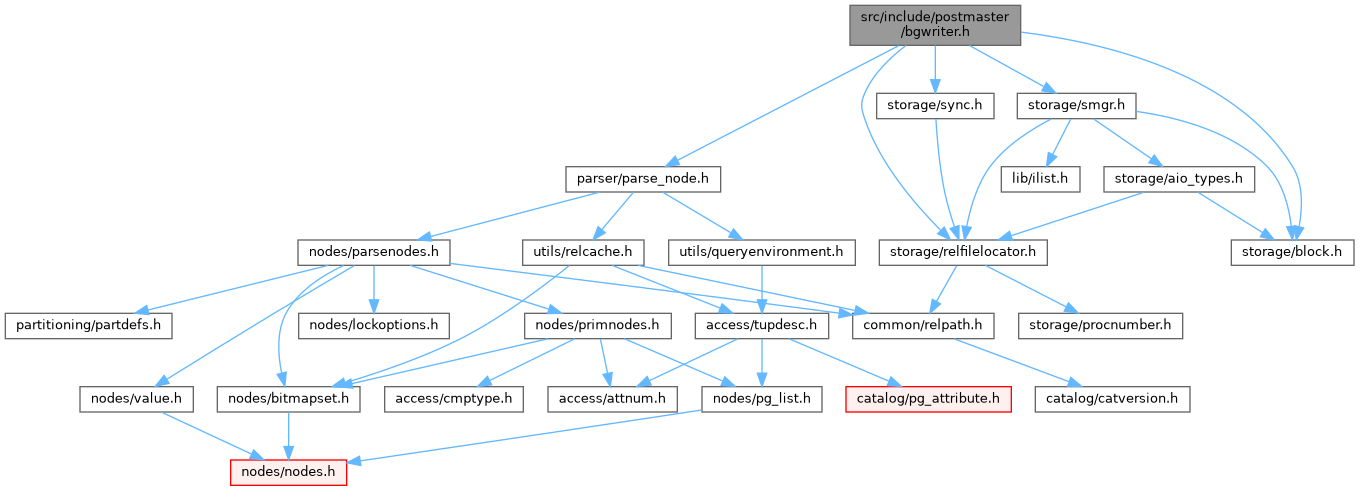#include "parser/parse_node.h"#include "storage/block.h"#include "storage/relfilelocator.h"#include "storage/smgr.h"#include "storage/sync.h"

Go to the source code of this file.
Functions | |
| pg_noreturn void | BackgroundWriterMain (const void *startup_data, size_t startup_data_len) |
| pg_noreturn void | CheckpointerMain (const void *startup_data, size_t startup_data_len) |
| void | ExecCheckpoint (ParseState *pstate, CheckPointStmt *stmt) |
| void | RequestCheckpoint (int flags) |
| void | CheckpointWriteDelay (int flags, double progress) |
| bool | ForwardSyncRequest (const FileTag *ftag, SyncRequestType type) |
| void | AbsorbSyncRequests (void) |
| Size | CheckpointerShmemSize (void) |
| void | CheckpointerShmemInit (void) |
| bool | FirstCallSinceLastCheckpoint (void) |
Variables | |
| PGDLLIMPORT int | BgWriterDelay |
| PGDLLIMPORT int | CheckPointTimeout |
| PGDLLIMPORT int | CheckPointWarning |
| PGDLLIMPORT double | CheckPointCompletionTarget |
Function Documentation
◆ AbsorbSyncRequests()
Definition at line 1436 of file checkpointer.c.
References AmCheckpointerProcess, CheckpointerShmem, CKPT_REQ_BATCH_SIZE, END_CRIT_SECTION, fb(), CheckpointerShmemStruct::head, i, LW_EXCLUSIVE, LWLockAcquire(), LWLockRelease(), CheckpointerShmemStruct::max_requests, Min, CheckpointerShmemStruct::num_requests, palloc(), pfree(), RememberSyncRequest(), CheckpointerShmemStruct::requests, and START_CRIT_SECTION.
Referenced by CheckpointerMain(), CheckpointWriteDelay(), CreateCheckPoint(), ProcessSyncRequests(), SyncPostCheckpoint(), and SyncPreCheckpoint().
◆ BackgroundWriterMain()
|
extern |
Definition at line 88 of file bgwriter.c.
References ALLOCSET_DEFAULT_SIZES, AllocSetContextCreate, Assert, AtEOXact_Buffers(), AtEOXact_Files(), AtEOXact_HashTables(), AtEOXact_SMgr(), AuxiliaryProcessMainCommon(), BgBufferSync(), bgwriter_flush_after, BgWriterDelay, ConditionVariableCancelSleep(), EmitErrorReport(), error_context_stack, fb(), FirstCallSinceLastCheckpoint(), FlushErrorState(), GetCurrentTimestamp(), GetLastImportantRecPtr(), HIBERNATE_FACTOR, HOLD_INTERRUPTS, last_snapshot_lsn, last_snapshot_ts, LOG_SNAPSHOT_INTERVAL_MS, LogStandbySnapshot(), LWLockReleaseAll(), MemoryContextReset(), MemoryContextSwitchTo(), MyLatch, MyProcNumber, now(), PG_exception_stack, pg_usleep(), pgaio_error_cleanup(), pgstat_report_bgwriter(), pgstat_report_wait_end(), pgstat_report_wal(), pqsignal, ProcessMainLoopInterrupts(), procsignal_sigusr1_handler(), RecoveryInProgress(), ReleaseAuxProcessResources(), ResetLatch(), RESUME_INTERRUPTS, SIGALRM, SIGCHLD, SIGHUP, SignalHandlerForConfigReload(), SignalHandlerForShutdownRequest(), SIGPIPE, SIGUSR1, SIGUSR2, smgrdestroyall(), StrategyNotifyBgWriter(), TimestampTzPlusMilliseconds, TopMemoryContext, UnBlockSig, UnlockBuffers(), WaitLatch(), WL_EXIT_ON_PM_DEATH, WL_LATCH_SET, WL_TIMEOUT, WritebackContextInit(), and XLogStandbyInfoActive.
◆ CheckpointerMain()
|
extern |
Definition at line 195 of file checkpointer.c.
References AbsorbSyncRequests(), ALLOCSET_DEFAULT_SIZES, AllocSetContextCreate, Assert, AtEOXact_Buffers(), AtEOXact_Files(), AtEOXact_HashTables(), AtEOXact_SMgr(), AuxiliaryProcessMainCommon(), before_shmem_exit(), CheckArchiveTimeout(), CHECKPOINT_CAUSE_TIME, CHECKPOINT_CAUSE_XLOG, CHECKPOINT_END_OF_RECOVERY, CheckpointerShmemStruct::checkpointer_pid, PROC_HDR::checkpointerProc, CheckpointerShmem, CheckPointTimeout, CheckPointWarning, ckpt_active, ckpt_cached_elapsed, CheckpointerShmemStruct::ckpt_done, CheckpointerShmemStruct::ckpt_failed, CheckpointerShmemStruct::ckpt_flags, CheckpointerShmemStruct::ckpt_lck, ckpt_start_recptr, ckpt_start_time, CheckpointerShmemStruct::ckpt_started, ConditionVariableBroadcast(), ConditionVariableCancelSleep(), CreateCheckPoint(), CreateRestartPoint(), DisableLogicalDecodingIfNecessary(), CheckpointerShmemStruct::done_cv, EmitErrorReport(), ereport, errhint(), errmsg_plural(), error_context_stack, ExitOnAnyError, fb(), FlushErrorState(), GetInsertRecPtr(), GetXLogReplayRecPtr(), HOLD_INTERRUPTS, last_checkpoint_time, last_xlog_switch_time, LOG, LWLockReleaseAll(), MemoryContextReset(), MemoryContextSwitchTo(), Min, MyLatch, MyProcNumber, MyProcPid, now(), PgStat_CheckpointerStats::num_performed, PgStat_CheckpointerStats::num_requested, PgStat_CheckpointerStats::num_timed, PendingCheckpointerStats, PG_exception_stack, pg_usleep(), pgaio_error_cleanup(), pgstat_before_server_shutdown(), pgstat_report_checkpointer(), pgstat_report_wait_end(), pgstat_report_wal(), PMSIGNAL_XLOG_IS_SHUTDOWN, pqsignal, proc_exit(), ProcessCheckpointerInterrupts(), ProcGlobal, procsignal_sigusr1_handler(), RecoveryInProgress(), ReleaseAuxProcessResources(), ReqShutdownXLOG(), ResetLatch(), PgStat_CheckpointerStats::restartpoints_performed, PgStat_CheckpointerStats::restartpoints_requested, PgStat_CheckpointerStats::restartpoints_timed, RESUME_INTERRUPTS, SendPostmasterSignal(), ShutdownRequestPending, ShutdownXLOG(), ShutdownXLOGPending, SIGALRM, SIGCHLD, SIGHUP, SignalHandlerForConfigReload(), SignalHandlerForShutdownRequest(), SIGPIPE, SIGUSR1, SIGUSR2, smgrdestroyall(), SpinLockAcquire(), SpinLockRelease(), CheckpointerShmemStruct::start_cv, TopMemoryContext, UnBlockSig, UnlockBuffers(), UpdateSharedMemoryConfig(), WaitLatch(), WL_EXIT_ON_PM_DEATH, WL_LATCH_SET, WL_TIMEOUT, and XLogArchiveTimeout.
◆ CheckpointerShmemInit()
Definition at line 978 of file checkpointer.c.
References CheckpointerShmem, CheckpointerShmemSize(), CheckpointerShmemStruct::ckpt_lck, ConditionVariableInit(), CheckpointerShmemStruct::done_cv, CheckpointerShmemStruct::head, MAX_CHECKPOINT_REQUESTS, CheckpointerShmemStruct::max_requests, MemSet, Min, NBuffers, ShmemInitStruct(), SpinLockInit(), CheckpointerShmemStruct::start_cv, and CheckpointerShmemStruct::tail.
Referenced by CreateOrAttachShmemStructs().
◆ CheckpointerShmemSize()
Definition at line 956 of file checkpointer.c.
References add_size(), fb(), MAX_CHECKPOINT_REQUESTS, Min, mul_size(), and NBuffers.
Referenced by CalculateShmemSize(), and CheckpointerShmemInit().
◆ CheckpointWriteDelay()
Definition at line 790 of file checkpointer.c.
References AbsorbSyncRequests(), AmCheckpointerProcess, CheckArchiveTimeout(), CHECKPOINT_FAST, ConfigReloadPending, FastCheckpointRequested(), fb(), IsCheckpointOnSchedule(), MyLatch, PGC_SIGHUP, pgstat_report_checkpointer(), ProcessConfigFile(), ProcessProcSignalBarrier(), ProcSignalBarrierPending, progress, ResetLatch(), ShutdownRequestPending, ShutdownXLOGPending, UpdateSharedMemoryConfig(), WaitLatch(), WL_EXIT_ON_PM_DEATH, WL_LATCH_SET, WL_TIMEOUT, and WRITES_PER_ABSORB.
Referenced by BufferSync().
◆ ExecCheckpoint()
|
extern |
Definition at line 1011 of file checkpointer.c.
References CHECKPOINT_FAST, CHECKPOINT_FLUSH_UNLOGGED, CHECKPOINT_FORCE, CHECKPOINT_WAIT, defGetBoolean(), defGetString(), ereport, errcode(), errdetail(), errmsg(), ERROR, fb(), foreach_ptr, GetUserId(), has_privs_of_role(), mode, parser_errposition(), RecoveryInProgress(), RequestCheckpoint(), and stmt.
Referenced by standard_ProcessUtility().
◆ FirstCallSinceLastCheckpoint()
Definition at line 1526 of file checkpointer.c.
References CheckpointerShmem, CheckpointerShmemStruct::ckpt_done, CheckpointerShmemStruct::ckpt_lck, fb(), SpinLockAcquire(), and SpinLockRelease().
Referenced by BackgroundWriterMain().
◆ ForwardSyncRequest()
|
extern |
Definition at line 1224 of file checkpointer.c.
References AmCheckpointerProcess, CheckpointerShmemStruct::checkpointer_pid, PROC_HDR::checkpointerProc, CheckpointerShmem, CompactCheckpointerRequestQueue(), elog, ERROR, fb(), CheckpointerRequest::ftag, GetPGProcByNumber, INVALID_PROC_NUMBER, IsUnderPostmaster, LW_EXCLUSIVE, LWLockAcquire(), LWLockRelease(), CheckpointerShmemStruct::max_requests, CheckpointerShmemStruct::num_requests, ProcGlobal, CheckpointerShmemStruct::requests, SetLatch(), CheckpointerShmemStruct::tail, and type.
Referenced by RegisterSyncRequest().
◆ RequestCheckpoint()
Definition at line 1074 of file checkpointer.c.
References CHECK_FOR_INTERRUPTS, CHECKPOINT_FAST, CHECKPOINT_REQUESTED, CHECKPOINT_WAIT, PROC_HDR::checkpointerProc, CheckpointerShmem, CheckpointerShmemStruct::ckpt_done, CheckpointerShmemStruct::ckpt_failed, CheckpointerShmemStruct::ckpt_flags, CheckpointerShmemStruct::ckpt_lck, CheckpointerShmemStruct::ckpt_started, ConditionVariableCancelSleep(), ConditionVariablePrepareToSleep(), ConditionVariableSleep(), CreateCheckPoint(), CheckpointerShmemStruct::done_cv, elog, ereport, errhint(), errmsg(), ERROR, fb(), GetPGProcByNumber, INVALID_PROC_NUMBER, IsPostmasterEnvironment, LOG, MAX_SIGNAL_TRIES, pg_usleep(), ProcGlobal, SetLatch(), smgrdestroyall(), SpinLockAcquire(), SpinLockRelease(), and CheckpointerShmemStruct::start_cv.
Referenced by CreateDatabaseUsingFileCopy(), do_pg_backup_start(), dropdb(), DropTableSpace(), ExecCheckpoint(), movedb(), PerformRecoveryXLogAction(), StartupXLOG(), XLogPageRead(), and XLogWrite().
Variable Documentation
◆ BgWriterDelay
|
extern |
Definition at line 58 of file bgwriter.c.
Referenced by BackgroundWriterMain(), and BgBufferSync().
◆ CheckPointCompletionTarget
|
extern |
Definition at line 159 of file checkpointer.c.
Referenced by assign_checkpoint_completion_target(), CalculateCheckpointSegments(), IsCheckpointOnSchedule(), and XLOGfileslop().
◆ CheckPointTimeout
|
extern |
Definition at line 157 of file checkpointer.c.
Referenced by CheckpointerMain(), and IsCheckpointOnSchedule().
◆ CheckPointWarning
|
extern |
Definition at line 158 of file checkpointer.c.
Referenced by CheckpointerMain().